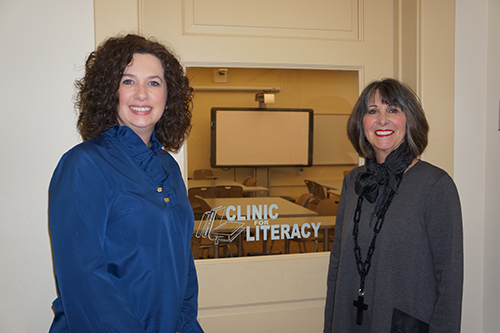A new University of Arkansas literacy initiative pairs two graduate courses with a two-week clinic this summer to provide one-on-one literacy instruction for children who struggle with reading and writing.
Linda Eilers and Heather Kindall created the University of Arkansas Clinic for Literacy in the College of Education and Health Professions. The clinic has a small space in Peabody Hall to store materials including books, curriculum guides, assessment tools and iPads.
"The idea behind the Clinic for Literacy is to help children one-on-one," said Kindall, an assistant professor of childhood and elementary education.
Eilers, a clinical associate professor of childhood education, is working with local school districts to establish satellite locations where U of A graduate students will meet with children who could benefit from the assistance, as identified by their teachers. There will be a fee for services.
Two enrollment options are available for the literacy courses: one for U of A graduate credit for students enrolled in graduate school and the other as professional development credit for teachers who already are licensed.
The courses will be scheduled in July, close to the beginning of the school year in the fall, so that part of the benefit is to reduce the amount of learning children tend to lose over the summer vacation. The clinic has both fiction and nonfiction texts, including pieces aligned with Common Core, in its collection and several assessment tools for U of A students to use.
"U of A students enrolled in both courses will spend the first three weeks of the summer sessions receiving instruction and becoming familiar with the materials," Eilers said. "With the assessment tools, they can evaluate children's phonemic awareness, phonics, vocabulary, fluency and comprehension, as well as screen for dyslexia. During the last two weeks, they work one-on-one with children to assess literacy, then design and implement an individualized intervention program for them."
The foundation of the interventions will be research-based, she said.
For more information about enrolling, contact Eilers at leilers@uark.edu.
Contacts
Heidi Wells, director of communications
College of Education and Health Professions
479-575-3138,
